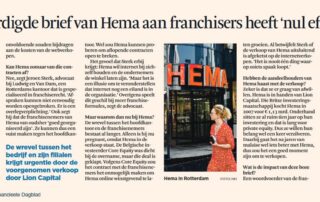Developments in competition law
Some time ago, the Netherlands Competition Authority (NMa) made a groundbreaking ruling that is of great importance to all franchise organizations in the Netherlands.
Franchise agreements can be regarded as vertical agreements, which means that they are agreements between companies operating at different levels in the supply chain. The competition law for these vertical cooperation relationships, as it follows from the foregoing, every franchise organization should be by nature, is dominated in the first place by the market share of the relevant franchise organization on the “relevant market”.
The term ‘relevant market’ is not entirely unambiguous, but must in any case be distinguished into the relevant product market on the one hand and the relevant geographic market on the other. In short, the relevant product market comprises those products and/or services which, by reason of their characteristics, prices and intended use, are regarded by the end-user or customer as interchangeable or substitutable. The relevant geographic market, on the other hand, is the area within which the undertakings concerned play a role in the supply and demand of goods or services, in which the competitive conditions are sufficiently homogeneous and which can be distinguished from neighboring areas because the conditions of competition are clearly different.1
The so-called “de minimis announcement” played a decisive role in the aforementioned decision of the Nma. The “de minimis notice” (which has already been discussed several times in this series) stipulates that there is no appreciability in the context of vertical agreements if the market share on the relevant market does not exceed 15 % and furthermore, the agreement does not contain any so-called “hard-core restrictions”.
1. Commission Notice of 9 December 1997 on the definition of the relevant market for common competition law, OJ 1997, C-372/05.
The aforementioned ruling also has consequences for provisions in the area of exclusive purchasing and non-competition, among other things. The possibilities in that context for franchise organizations can be considerably expanded. This will be discussed in more detail in one of the upcoming articles.
Ludwig & Van Dam franchise attorneys, franchise legal advice

Other messages
HEMA in conflict with franchisees about e-commerce agreements
On 18 July 2018, the District Court of Amsterdam, ECLI:NL:RBAMS:2018:5098, rendered a judgment in proceedings on the merits in which the franchisees were largely ruled in favor of e-commerce.
mr. J. Sterk about HEMA conflict in the FD 18 July 2018
mr. J. Sterk about HEMA conflict in the FD.
Column Franchise+ – “Legal Franchise Statistics 2018”
The Legal Franchise Statistics have been compiled for 10 years by Ludwig & Van Dam attorneys on the basis of all published judgments of judges.
Franchisor prohibits opening (franchise) company
A franchisor applied for interim measures to prohibit a franchisee from opening a franchisee's business.
Column Snack courier no. 8: “With 7 steps you comply with the privacy law”
Much has already been written about the General Data Protection Regulation (GDPR). The law has been applicable since 25 May, but many companies have not yet had their privacy policy in order.
Forced to switch to a different franchise formula at the existing location?
If a franchise formula ceases to exist, for example if it is incorporated into another organization, the question may be whether the franchisee is also obliged to be incorporated into







